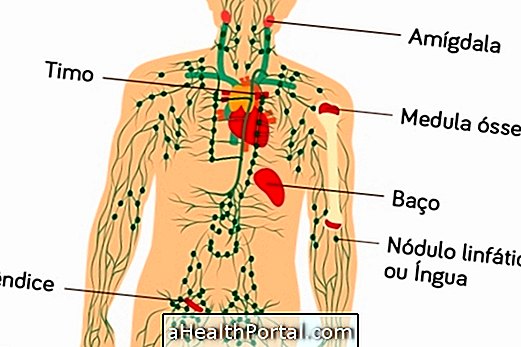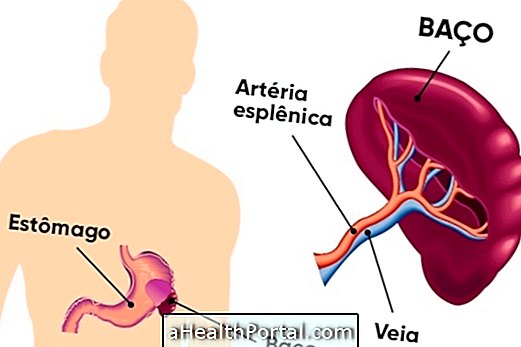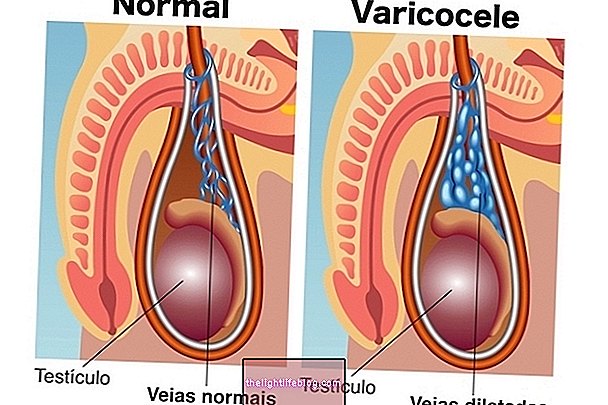Neck pain is usually not a sign of a serious problem, and is more common in cases of over-tension caused by situations such as emotional stress, increased blood pressure or anxiety, for example. Normally, in these cases it is also possible to feel the neck more rigid and a pain in both sides of the nape.
However, there are some cases where neck pain may be a symptom of a more serious problem such as meningitis or aneurysm, but in these cases it is usually accompanied by severe nausea, vomiting, or fever. Check the symptoms of meningitis.

1. High Blood Pressure
Situations that cause an exaggerated increase in blood pressure, such as emotional stress or depression, for example, are one of the main causes of neck pain, also leading to other symptoms such as neck stiffness and back pain. In these cases, the pain in the neck remains stable, not worsening over time.
- How to treat : The best way to relieve this type of pain is to relax during the day to try to lower blood pressure and prevent muscle contraction. For this, one can participate in relaxing activities like yoga, pilates or massages, for example. However, at the time of the crisis one should rest and put icy compresses at the pain site. In cases of depression, it is important to follow the treatment recommended by the psychologist or psychiatrist. Here's how to do a relaxing self-massage.
2. Contracture or torticollis
Another very common cause of neck pain is the presence of muscle problems such as contractures or torticollis in the neck or upper back region. Generally, this type of pain arises after doing intense workouts of these muscles, but can also happen by bad posture during the day or to sleep.
- How to treat : Put hot compresses on the back and neck and rest. If the pain does not improve, go to the general practitioner as it may be necessary to start using muscle relaxants or analgesics such as Cyclobenzaprine Hydrochloride or Paracetamol. Check out 4 steps to end neck pain or stretches for neck pain.
3. Arthritis
By causing the development of inflammation and pain in the joints, arthritis can also be one of the causes of neck pain. This is because, in the region of the neck, there are several joints between the vertebrae of the spine. Thus, if there is inflammation at these sites, pain may radiate to the nape of the neck. Usually, this type of pain worsens with the movement of the neck, worsening throughout the day.
- How to treat : To relieve pain crises you should consult a rheumatologist to start using anti-inflammatories, such as ibuprofen, or muscle relaxants, such as thiocolchicoside. However, to prevent pain from recurring one should do activities that help relieve weight on joints such as water aerobics, pilates or yoga, for example. Watch this video on how to relieve arthritis pain:

4. Meningitis
Meningitis is one of the most serious causes of neck pain, and although it is rare, it can occur at any age, especially if there is an outbreak of the disease. In these cases, the pain in the neck is very strong and appears along with other symptoms such as fever, nausea, vomiting and excessive tiredness.
- How to treat : Meningitis needs to be identified and treated as soon as possible, so whenever there is suspicion of the disease it is important to go to the emergency room to make the diagnosis and start the appropriate treatment, which may include the use of antibiotics. Learn more about how meningitis is treated.
5. Aneurysm
The brain aneurysm is a dilation of a blood vessel in the brain that may end up breaking with time and causing the onset of a hemorrhagic stroke. Generally, this type of change does not cause any symptoms before it breaks, but there are few cases where a constant headache may appear at the nape of the neck. When it breaks, the pain is very strong and sudden and can continue to worsen over time.
- How to treat : If a ruptured aneurysm is suspected, it is very important to go to the hospital immediately or call an ambulance by calling 192. Aneurysm rupture causes the same type of sequelae as a stroke and can therefore life at risk. See the first symptoms to identify an aneurysm.
When to go to the doctor
It is recommended to consult a doctor when neck pain:
- It is incapacitating;
- It takes more than 48 hours to pass;
- It is accompanied by vomiting or fever above 38ºC;
In these cases, a clinician or neurologist should be consulted for tests, indication of the possible cause of neck pain, and appropriate treatment. The doctor may also advise the patient to an orthopedist when pain is caused by diseases in the spine or muscle problems, for example.





















